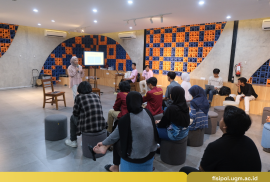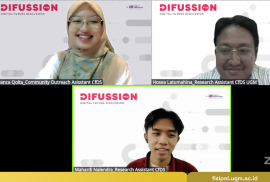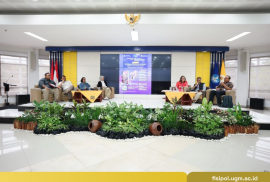Yogyakarta, 27 October 2025─Peer counselors from the Career Development Center (CDC) of the Faculty of Social and Political Sciences, Universitas Gadjah Mada (FISIPOL UGM) are once again organizing Mental Health Society 2025, an initiative that aims to raise awareness and concern among students about the importance of mental health. This activity is a tangible contribution from FISIPOL UGM peer counselors, who are trained students who have undergone intensive selection and training with professional psychologists.
News
Yogyakarta, October 27, 2025—The Academic Innovation unit of Fisipol UGM has initiated a new course titled “Forest Carbon Literacy 2025” on the FOCUS platform. The launching ceremony for the new course invited three speakers, as well as a module writer from the Forest Carbon Literacy 2025 course, that is Wahyu Yun Santoso (Lecturer at Fakultas of Law UGM), Budi Mulyana (Lecturer at Faculty of Forestry UGM), and Sarah Wibisono (Sustainability Consultant).
This year, the course is created with the intent to focus on the management of forest on the international level, emphasizing through cross-border comparison in understanding the best practices, as well as failures management of forests in other areas. In the making of this course, Fisipol UGM, through the Academic Innovation Unit, collaborated with UGM’s Faculty of Forestry, Faculty of Law, Chakra Giri Energi Indonesia, and Oxfam.
Yogyakarta, October 21, 2025—In an effort to support the development of student competency, the Faculty of Social and Political Science of Universitas Gadjah Mada implemented a new policy for every student who will graduate. As of July 2024, every graduate from the faculty is required to have an English Proficiency Test certificate equal to TOEFL ITP/IBT, ACEPT, as well as IELTS with at least a minimum score. For those who do not achieve the minimum score, there are two program schemes that can help graduates achieve the minimum score. This announcement was made in a socialization session by Fisipol’s Academic Innovation Unit on Monday (20/10).
Yogyakarta, October 15th 2025─Artificial Intelligence (AI) is now a hot topic that is not only discussed in academic circles, but also in industry and public policy. Through DIFUSSION (Digital Future Discussion) #128 entitled “Indonesia’s AI Trajectory: From Hype to Investment Challenges,” the Center for Digital Society (CfDS) UGM traces the journey of AI in Indonesia, from technological euphoria to the real challenges in building a sustainable ecosystem that is in line with national interests.
Yogyakarta, 2 October 2025–The Faculty of Social and Political Sciences, Universitas Gadjah Mada (FISIPOL UGM) held a workshop entitled “Contesting Hegemony: Labor, Ideology, and the Limits of Resistance in Post-Authoritarian Indonesia” in the FISIPOL UGM’s 4th floor auditorium. The event featured four speakers: Vedi Hadiz (University of Melbourne), Hari Nugroho (Universitas Indonesia), Diatyaka Yasih (Universitas Indonesia), and Muhtar Habibi (Universitas Gadjah Mada). The discussion explored how power, ideology, and the working class interact in Indonesia’s post-New Order political and economic system, as well as the extent to which community survival strategies can develop into forms of resistance against hegemonic domination.
As the Director at Directorat of Partnership, Alumni and Global Initiatives of Universitas Gadjah Mada, Prof. Dr. Puji Astuti, S.Si., M.Sc., Apt. welcomed the Chinese Ambassador to Indonesia, leaders from Xiamen University, as well as faculty staff from Fisipol UGM. She mentioned that the achievements in years of bilateral cooperation has strengthened Indonesia’s relationship with China in the aspect of trade, culture, and national development. “Today, we will continue to strengthen our commitment to strategic cooperation, especially in the field of infrastructure, information, and technology. We will open communication mainly to balance it with our national interests,” She added.
In line with that spirit, the Chinese Ambassador to Indonesia, Mr Wang Lutong, felt honored to be a part of Indonesia’s friendship with China. According to him, the world is in the middle of facing new challenges that can possibly change the future. Global South countries must then cooperate and coordinate in order to face this issue, while also maintaining security as well as just global policies. “China and Indonesia are two big nations, and our 75 years of bilateral diplomatic relations has become a model for other countries to follow,” He said.
Yogyakarta, October 1st 2025─The Faculty of Social and Political Sciences, Universitas Gadjah Mada (FISIPOL UGM) and the University of Melbourne launched a book entitled Rethinking Histories of Indonesia: Experiencing, Resisting, and Renegotiating Coloniality at the 4th floor auditorium of FISIPOL UGM. The event featured four speakers from various institutions, namely Kate McGregor (University of Melbourne), Abdul Wahid (Universitas Gadjah Mada), Brigitta Isabella (Indonesian Institute of the Arts), and I Ngurah Suryawan (University of Papua).
Yogyakarta, October 1st 2025 – Seventy years after the historic event of Bandung Conference in 1955, where twenty nine leaders from Asia and Africa united against colonialism and formulated a new vision for the world, the spirit of Bandung remains relevant today. The Institute of International Studies (IIS), Faculty of Social and Political Sciences (FISIPOL) at Universitas Gadjah Mada (UGM), carries this spirit forward by organizing the Annual Convention on the Global South (GO SOUTH 2025) on October 1–2, 2025. This convention will be held offline at the campus of UGM, Yogyakarta, and carries the theme: “70 Years of the Bandung Spirit: Re-invigorating the Decolonial Struggle amidst Geopolitical Turbulence.” This convention will be a forum dedicated to examining the dynamics of the Global South, which continues to evolve amid the complexity of the current global geopolitical and economic situation.
Yogyakarta, September 30th 2025 – The Global Humanities Alliance Roundtable Forum officially opened on Tuesday (9/30) with eight world universities, including the Faculty of Social and Political Sciences, Universitas Gadjah Mada. As one of the pioneers of the GHA, FISIPOL UGM hosted this year’s meeting, which was held in conjunction with the 70th anniversary of FISIPOL UGM.
The Dean of the Faculty of Social and Political Sciences at Universitas Gadjah Mada, Wawan Mas’udi, S.I.P., M.P.A., Ph.D., conveyed the importance of opening up opportunities for students to work in the international arena. The learning process cannot be limited to classrooms alone. Understanding various fields of study, especially social humanities, requires involvement in various social and cultural aspects. Through this initiative, it is hoped that brilliant ideas will emerge in response to global challenges. “We do have an agenda to become more engaged with the global community, and this is one of our strategies to facilitate students,” he said.
Yogyakarta, 30 September 2025–The Faculty of Social and Political Sciences (FISIPOL) Universitas Gadjah Mada hosted the Global Humanities Alliance (GHA) Steering Committee Meeting, an important forum that marked the launch of a series of international cooperation activities.
One of the main agendas of this meeting was the signing of two Memoranda of Understanding (MoUs) involving eight GHA member universities from various countries. The signing was an important milestone in strengthening global collaboration networks in the humanities and social sciences.









